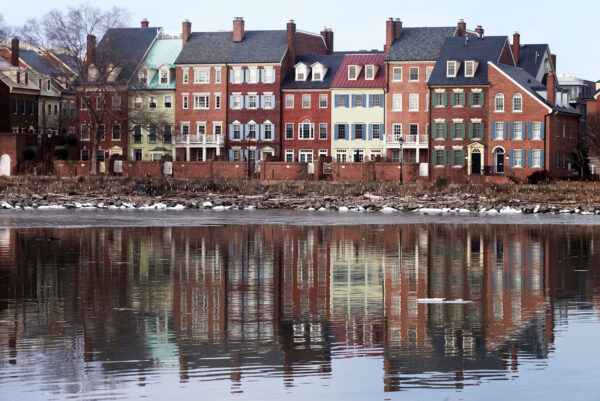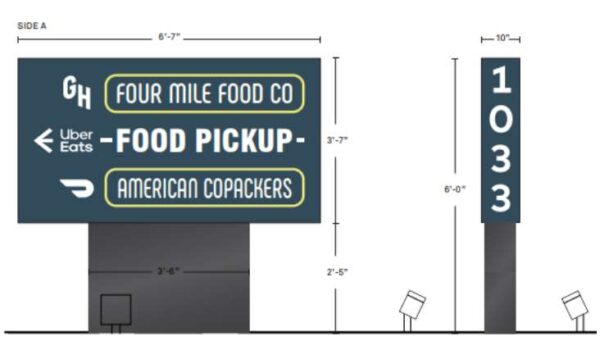
A new zoning request for an Arlandria ghost kitchen provided an update on an approved use that’s been haunting the northern edge of the city since 2021.
Applicant 1033 W Glebe Road ALX is requesting a permit to allow a sign to be built along W Glebe Road that will direct visitors to the kitchen tucked behind the back of a strip mall at 1033 W Glebe Road.
The new 32-square-foot sign is a fairly inoffensive change — unlikely to stir up the kind of controversy nearby music venue The Birchmere went through with its sign change — and staff expressed support in a report on the new sign.
The main item of note in the report is that, while the site has not opened, the plans for the ghost kitchen aren’t dead:
On July 1, 2021, Special Use Permit (SUP) #2021-00049 was approved for an administrative new use to allow the applicant to operate a restaurant, which consists of 24 separate commercial kitchens operated by restaurateurs, who prepare food for carry-out and delivery to individual customers. As of the writing of this report, the space for the applicant is still under construction, and improvement to the driveway and parking lot has not been finalized. When completed, the restaurant and American Co-packers will each occupy approximately half the building.
The building will have a lobby space to accommodate food pick-up for customers, but there will be no indoor dining. The kitchen will operate from 7 a.m. to midnight — and sometimes until 4 a.m. — seven days a week.
“The multiple commercial kitchen concept serves as a restaurant incubator for individual chefs, entering the restaurant market,” the report said.
The permit for the sign is scheduled for review at the Planning Commission meeting on Tuesday, May 2.

1799 Prime Steak and Seafood might be famous for its eponymous steaks, but it was a wayward sausage that stole the discussion at the City Council meeting this weekend.
The restaurant at 110 S. Pitt Street was seeking a permit to significantly expand its outdoor dining in a courtyard behind the building, from 40 patrons to 104.
The move prompted some outcry from neighbors who cited concerns about those patrons behind the building being able to safely exit the courtyard in the event of an emergency and worries that the expansion could encroach on the neighboring alleyway.
The Council ultimately approved the permit for 1799 Prime Steak and Seafood at a meeting on Saturday with slight modifications and relatively little by way of debate.
One of the issues that garnered the most discussion from the City Council was, in fact, one of founder and CEO Jahmond Quander’s issues with one of his neighbors. Quander said he will try to be respectful of his neighbors in terms of sound, but in return hopes one of them can keep a sight away from diners.
“I want to be respectful of my neighbors that are right there,” Quander said. “I’ve already been dealing with issues. I have one neighbor who leaves his shade up and he likes to walk around nude.”
Someone from the dais shouted “TMI.”
“I have several responses to that, probably all of them would be inappropriate,” said Mayor Justin Wilson. “You might want to advertise that.”
Addressing the more serious issues raised by neighbors about egress from the site, the City Council mostly pushed that discussion to the Alexandria Fire Department for the restaurant’s occupancy permit.
“I think seats are kind of a dumb thing to use to measure these things, particularly for outdoor space,” Wilson said. “If you have an outdoor gathering, people are standing and walking around. The occupancy is what matters, and that’s why the fire code looks at that.”
The Council added a provision reinforcing that the outdoor seating cannot encroach on neighboring property. City Council member Sarah Bagley said the Alexandria Fire Department was better situated to address questions about safe occupancy for the outdoor seating.
“We’re leaving it to our fire department to determine correct occupancy,” Bagley said. “I was uncomfortable with our role here dictating numbers and seats. My understanding is we’re leaving this to code professionals with this choice.”
Bagley also took a moment to celebrate the success of 1799 Prime Steak & Seafood, which opened last year in the former Restaurant Eve space.
“I wanted to take a moment to acknowledge the success and express my appreciation for the purchase and renovation,” Bagley said. “I only learned of the success because I finally asked one of my colleagues: what is going on at South Pitt Street? Because I see fabulously dressed people coming and going.”
“And apparently someone who wasn’t fabulously dressed,” Wilson added.

After extensive public comment and a few interruptions, Alexandria’s City Council voted unanimously to approve a zoning change that would bring zoning requirements for abortion centers in line with other medical facilities.
The gist of the change is that abortion would be included with other healthcare-related uses for by-right approval in commercial and mixed-use zones.
But, as has become a trend in Alexandria’s City Council discussions, discussions related to abortion often create significant public comment. Most of the speakers before the agenda item spoke in opposition to the zoning. Multiple times, the City Council discussion was interrupted with shouts of “Abortion is murder.”
Despite the protests, the City Council was unanimous in their support for the zoning change.
“This is about a woman’s right to choose; an individual’s right to choose,” said Vice Mayor Amy Jackson, “and that abortion is women’s healthcare.”
City Council member Kirk McPike said the proposal does not “prioritize abortion providers over other forms of healthcare providers” but instead levels the playing field so abortion providers are treated the same as other medical offices.
“This is appropriate because abortion care is healthcare,” McPike said. The freedom and ability to decide when and whether to have another child, to be able to address a desperately wanted pregnancy that has sadly gone awry and is going to not be viable. These are essential freedoms that are at the heart of this discussion. They are freedoms that the people of Alexandria support and this text amendment helps us ensure for the residents of our city.”
City Council member Sarah Bagley reiterated the prevailing stance on the City Council:
I want to invite those who comment on the marvel of women’s ability to carry a pregnancy and create life to also marvel at their ability to make their own choices. We are more than our wombs. We are also our brains and intentions and choices for ourselves. I would invite you to consider that: for each person, this is a choice that they make and they are best positioned to make. We are more than simply the marvel of our potential life producing abilities, we are also a marvel in our ability to make responsible, sound healthcare decisions for ourselves.
City Council member Alyia Gaskins said abortion should not be considered separately from other issues related to women’s health:
What we are talking about here is: how do we make sure our definitions around healthcare facilities are clear and easy for our staff and land use decision makers to interpret. It’s been said up here and I’ll say it again: abortion is an important component of women’s healthcare. When you look at the facts: it’s included in medical training, it’s included in clinical practices, it’s a part of medical education…
We are talking about medical procedures and licensed professionals. There are many different decisions or factors that influence a woman’s decision as to whether or not to have an abortion, and that decision is her decision.
The City Council voted unanimously to approve the zoning change.
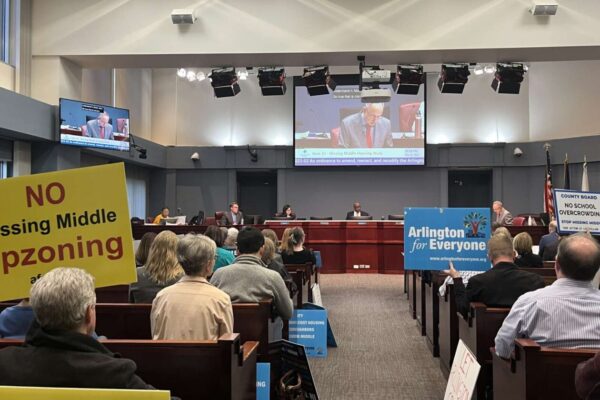
After the Arlington County Board voted this week to allow multifamily structures in single-family home zoning, some Alexandrians looked north as a hopeful example and others as a warning of what could be ahead.
The Missing Middle vote — referring to the multi-family structures that proponents hope will help make housing more affordable — created nearly unprecedented levels of controversy in Arlington County.
Just hours after the vote, leading advocates in favor of eliminating single-family zoning said the next step of the fight is in Alexandria.
The next big upzoning fight will be in Alexandria, let's check in on the local NIMBYs: "How about a population cap?" pic.twitter.com/yQIgvG7mtN
— Luca Gattoni-Celli (@TheGattoniCelli) March 23, 2023
Alexandria just launched a major new affordable housing initiative this week called Zoning for Housing/Housing for All, aiming to reshape parts of the city’s zoning code from the ground up to further emphasize affordable housing, but those plans stop short of eliminating zoning for single-family housing.
Luca Gattoni-Celli, founder of YIMBYs of NoVA, spoke at the City Council last year and argued in favor of reform to single-family zoning. But while Alexandria’s generally been a regional leader in pushing for affordable housing, city leaders have been reticent to jump onto the “eliminate single-family housing zoning” bandwagon.
Alexandria’s Mayor Justin Wilson said it won’t be as simple as copying and pasting Arlington’s approach into Alexandria. According to Wilson:
While Alexandria and Arlington are similar communities, there are clearly big distinctions as well. When crafting answers to our shortage of housing and inequitable access, we must develop an Alexandria approach. Arlington’s actions offer some lessons as well as urgency for our work.
Bill Rossello, a former City Council candidate and current President of the Seminary Hill Association, said his biggest concern is that a similar “Missing Middle” debate would be just as divisive in Alexandria as it has been in Arlington.
Rossello said he is concerned the Housing For All initiative could take Alexandria in a similar policy direction as Arlington and eliminate single-family home zoning. But like Wilson, Rossello said Alexandria’s housing landscape is different enough from Arlington that the housing affordability issues can’t be approached in exactly the same way:
The communities are fundamentally different even though they’re next-door neighbors as it relates to housing. We have a much wider array of housing than Arlington does. We’re more urbanized already and much more densely populated. Our single-family home housing stock is much lower. The detached single-family housing stock in Alexandria covers about 29% of the land parenthetically… and only accounts for about 12% of the housing units. In Arlington it’s the reverse, more than 70% of the land is within single-family home zones.
Rossello said in some ways, the land constraints already make questions about single-family homes moot.
“We just don’t have enough land to build single-family homes,” Rossello said. “But where we get chunks of land to satisfy the economic objectives of a developer while not creating crazy amounts more density [is] probably townhouses… I actually think the answer might be more townhouses as opposed to apartments.”
Rossello said Alexandria also needs to do more to explore three-bedroom opportunities.
“A lot of homes on Seminary Hill are small single-family homes,” Rossello said. “We need more of those opportunities so people who are 30-35 can find something they can afford but also meets their needs so they can have a baby and two dogs. What’s our missing middle? Our missing middle is that.”
A virtual community listening session for Zoning for Housing/Housing for All is scheduled for tonight (Thursday) from 6-8 p.m. A presentation on the initiative is scheduled for the start of the meeting, with captioning and interpretation services in Spanish, Amharic and Arabic. The Webinar ID for the Zoom meeting is 960 0721 3678 and the passcode is 727732.
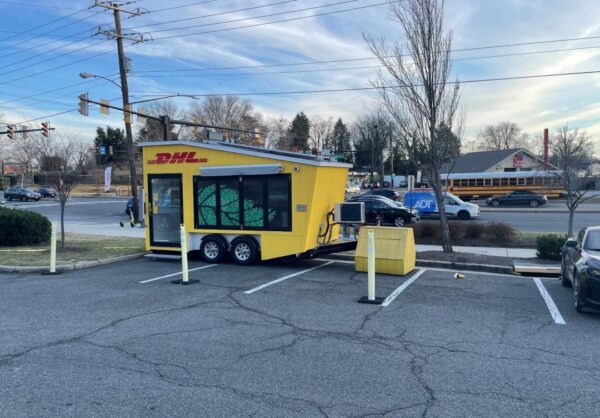
International shipping company DHL Express drew some flack from Alexandria’s Planning Commission after the company let slip in a recent meeting that they had no plans to find a permanent home for their “temporary” trailer business on Duke Street.
The company was granted approval for a temporary trailer set up in the parking lot of Shoppes of Foxchase (4513 Duke Street) during the pandemic. DHL was up for a two-year extension of their permit to operate in the parking lot but was applying for an additional three-year extension beyond that.
“This was supposed to be a temporary trailer several years ago,” said Planning Commissioner Mindy Lyle. “A temporary trailer was suggested as a use during the Covid emergency. The President is declaring an end to the Covid emergency in May. Therefore, I think we should go ahead with the two-year recommendation of staff.”
Lyle recommended DHL find space to set up shop permanently in one of the nearby empty retail locations.
“There’s lease space available in West End Village and Van Dorn Plaza,” Lyle said. “Two years is plenty of time to get a space built out, under contract, and move the trailer. No one in the neighborhood thinks the trailer is a good idea and I’m not sure why staff was recommending a two-year, then a three-year extension. I’m fine approving two years, then the trailer goes away because it really is a glorified sign.”
But representatives from DHL said the company is making the temporary trailers approved by Alexandria during the pandemic its new primary business model. Representatives said the company only has two brick-and-mortar locations but around 20 pop-ups.
“We are preparing to close one [brick and mortar] location,” said Kelly Shepard, head of US retail with DHL Express. “The model has made sense with pop-ups and brick-and-mortar has been not scalable for us. We’ve been focused on scaling for pop-ups and our sustainability goals.”
Shepard said the company’s plan was not to transition into a brick-and-mortar location. Shepard said the plan was to continue operating the pop-up as long as it was considered acceptable by the city.
“I understand we would have two years to try and solve the problem of how we could potentially stay in Alexandria, but as a company, after we opened our two brick-and-mortar locations and that was not successful for us, we made a decision that this was our way forward,” Shepard said. “The intention is not to look for another brick and mortar solution, it was to continue with the pop-up.”
This ruffled some feathers on the Planning Commission, with members indicating this may have been a dishonest use of the city’s temporary zoning allowances.
“What you’re saying is: this is no longer temporary, this is a permanent ‘temporary’ solution that will never go away and you’ll keep coming back for temporary usage of a trailer,” Lyle said. “Staff has either been deceived that this was a temporary use or didn’t ask the right questions of the applicant.”
Staff noted that there had been other temporary trailer uses granted to some businesses, but Planning Commissioner Melissa McMahon noted that each of those involved unique circumstances.
“I appreciate staff pointing out that we have trailers for other types of land use that we support, but there are some differences,” McMahon said. “In a couple of the cases, trailer supported brick and mortar use, and that’s important to keep a business here and make sure this works in the space they have.”
Lyle said that if DHL, being a global company, wanted to operate in Alexandria they should file a permit to open in a retail location like every other business.
“There are places all over the West End and developers who have spent millions for approval, millions renovation shopping centers, and I don’t believe it’s fair to local businesses that we allow a pop-up for some things and other people have to go into brick-and-mortar,” Lyle said.
Planning Commission Chair Nathan Macek proposed a compromise of a three-year extension from DHL to keep the approval consistent with other trailers approved in the past, which Lyle brought forward as a motion on the condition that, on Feb. 25, 2026, the trailer is gone.
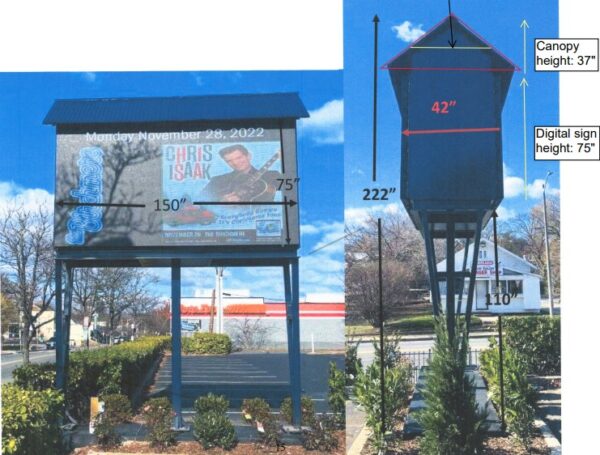
(Updated 10:10 a.m.) Like Bob Dylan, The Birchmere has switched to electric — at least for its signage. Also like Dylan, it’s a change that’s causing some trouble for the music venue.
It started last summer when famed music venue The Birchmere Music Hall (3701 Mount Vernon Avenue) was finding it difficult to hire someone to change out the letters on the venue’s old sign.
According to a special use permit application:
In July 2022, after having trouble finding people willing to do the manual labor of changing out the sign, trying to think of ways to enhance The Birchmere and attract additional business coming out of a devastating pandemic that severely impacted its revenues, and looking at the modern technology employed by other successful music venues in the region and beyond, the owner of the music venue replaced the changeable copy sign with a digital freestanding sign in the exact same location along Mount Vernon Avenue.
The venue owners built a new sign using the same pole as the original sign, with an additional pole on either side for added stability. The new sign is slightly larger than the previous one and has a new digital display.
Unfortunately for The Birchmere, the change ran afoul of the city’s zoning ordinance.
“Although the sign is constructed using the same sign pole as the original sign and is only slightly larger, the current sign can no longer be approved administratively due to the 2016 revisions to the Zoning Ordinance pertaining to signage requirements,” the special use permit said.
In November, a warning was issued to The Birchmere along with instructions to bring the sign back into compliance.
The venue has since filed an aforementioned special use permit application to waive some of the requirements for the sign.
“This modern sign, which allows for the digital change of copy, is consistent with the use of the Property as a music venue,” the permit application said. “The Birchmere is an iconic venue that has been attracting major artists and their fans to the City of Alexandria, celebrating music and contributing to the City’s tax base, for over forty years.”
The Birchmere argued in the application that the new sign isn’t causing any harm and is vital to the venue’s continued success.
“Given that the old sign and new sign are similar in size, in the same location, and illuminated (albeit through different mechanisms) there will be no negative impact of the new sign on pedestrians, drivers or the surrounding area,” the application said. “Finally, the proposed sign is a critical component of The Birchmere’s continued success as an arts and cultural venue, the value of which has been emphasized in the City’s Master Plans and economic development initiatives.”
The new sign application is scheduled to take the stage at a Planning Commission meeting on Feb. 7.
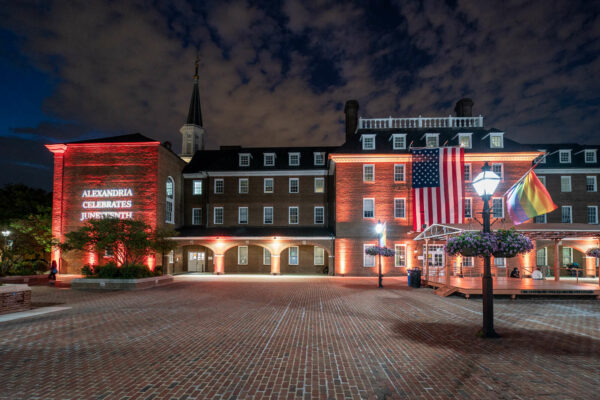
Alexandria has kicked off the new year with a glimpse at some of this year’s biggest priorities.
A memo from Director of Planning Karl Moritz, published ahead of Planning Commission meeting this Thursday, lays out some of the work priorities for the city over the upcoming year.
Planning and Zoning
There are some major items on the plate for Planning and Zoning, most of which involve updating some of the city’s older outdated plans for locations around the city.
- Alexandria West Plan: With some major developments reshaping the West End over the coming year, the city launched last fall an 18-month planning process for a large swath of the neighborhood. The process includes updates to the 1992 Alexandria West Small Area Plan and the 2008 Beauregard Plan, combining them into a sort of super-plan for the West End. According to the memo, priorities for that plan include “addressing topics such as equity, housing, mobility, land use, parks, infrastructure and safety.”
- Zoning for Housing/Housing for All: Another major project that started late last year and will continue through 2023 is the city’s Comprehensive Zoning for Housing and Housing for All Package” — a whole-cloth review of the city’s housing policy to try to work affordability into regulations from the ground-up. In a previous memo, Moritz said the goal is to remove policies and regulations that were intended to support exclusion and segregation, as well as creating new more equitable policies and boost the supply of both committed and market rate affordable housing. The goal is to complete the plan by the end of 2023.
- Vision Plan: This planning process will look at documenting and updating policies established in the various Small Area Plans dating back to 1992. This process is set to start this summer if staffing and resources are available.
- Duke Street Plan Update: This land use update is set to follow some of the ongoing plans around transforming transportation along Duke Street.
Alexandria could be on the verge of some of its biggest steps yet in the fight to make housing affordable in a city where housing prices continue to outpace wages.
At a meeting on Tuesday, Nov. 22, the City Council could jump-start a process set to run through next year that could dramatically reshape pieces of the city’s zoning code in an effort to make land use more equitable and inclusive. The “Comprehensive Zoning for Housing and Housing for All Package” involves a full sweep of large swaths of city zoning to look for ways to rewrite them from the ground up with a new emphasis on affordable housing and equity.
“The purpose of the Zoning for Housing Program is to examine potential new regulatory initiatives designed to help the City in its effort to expand housing production and affordability,” a staff memo said, “in addition, it is also intended to examine and address existing zoning provisions which may be regulatory barriers to housing options, affordability and fair housing or which, through remnants of terminology stemming from past discriminatory policy, may add to impediments to fair housing.”
The city has been tackling zoning issues piecemeal for years to make them more affordable, from the codification of more affordable zoning uses to trades of density for affordable housing units. The new package, however, is one of the ambitious “big picture” zoning plans from the city.
A memo to the City Council from Karl Moritz, director of the Department of Planning and Zoning, said the goals the zoning overhaul are:
- removing from City policies and regulations those provisions that were intended to support exclusion and segregation, and intended to deny opportunities for property ownership and wealth creation to persons of color,
- create new, more equitable land use policies that improve demographic and economic indicators that show that there are lasting vestiges of exclusionary practices even today, and
- materially increase the supply of committed affordable and market rate housing in the City.
In Alexandria, around 20% of households are paying over 30% of their income in housing, and around 10% are spending more than 50% on housing.
“Alexandria’s 2022 population is approximately 163,400 with approximately 71,500 households,” a report on the new package said. “City and federal U.S. Census data documents 15,000 Alexandria households are paying more than the federal standard of 30 percent of income on housing. Additionally, nearly half of those households with incomes up to $50,000 are paying more than 50 percent of their income on housing.”
Along with equity, the new comprehensive package of zoning reforms aims to find ways to boost both committed and market-rate affordable housing in the city.
A staff report identified goals as “to identify the impact of past discriminatory housing practices on quality-of-life factors today for populations of color and/or low income.” The overhaul will also look at the residual effects of past exclusionary zoning and look for ways to counter them with new policy goals and metrics.
An extensive list of zoning sections, from industrial zones to single-family housing, will come under review
The ambitious overhaul is currently in the pre-planning process, with a public launch scheduled for early next year leading into community engagement and analysis review over the spring and summer before heading into public hearings next fall.

Gov. Glenn Youngkin hasn’t always gotten the best reception in Alexandria, but recent comments about working with localities to establish better affordable housing zoning could help find some common ground with local leadership.
Alexandria Mayor Justin Wilson said a recent Washington Post article about a trip to Michigan included some promising comments about improving housing availability.
In the Washington Post interview, Youngkin said he’s interested in how the state and localities can work together to change zoning and regulatory practices that limit the building of high-density housing.
Alexandria’s been making moves in recent years to expand density options for developers in exchange for greater affordable housing funding, but as Virginia is a Dillon Rule state, Alexandria’s ability to draft regulations on limits like allowable density and how much can be traded for housing is limited by state legislation.
Buried in an unrelated Post article was a snippet about @GovernorVA and his interest in zoning reform to improve housing affordability.
This is good news!
Growing localities need Richmond to be a partner to address affordability.
Zoning reform is a big piece in that puzzle. pic.twitter.com/eMsVI4IVKj
— Justin Wilson (@justindotnet) August 19, 2022
While the generally liberal Alexandria has been frosty toward Alexandria’s Republican governor, it isn’t the first time there have been areas of overlapping interest. Shortly after Youngkin’s election, Wilson outlined several areas of shared interest, like holding Dominion accountable for outages and modernizing the tax structure.
Just one day after Youngkin was in the headlines for a spat at Safeway, staff from his Department of Transportation was in Alexandria with other local and state leaders to assess one of the crumbling Arlington-Alexandria bridges and show support for more infrastructure funding.
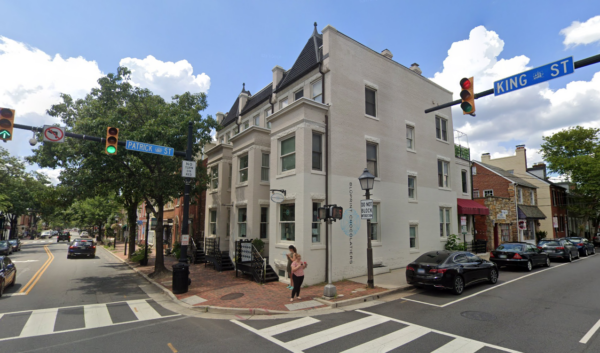
An update to one of Alexandria’s oldest housing types is headed to the Planning Commission (item 4) with changes that could make it a little more flexible.
Alexandria is seeking to update its zoning for accessory apartments in commercial zones, that is: housing typically build above commercial spaces as commonly seen in Old Town and other parts of Alexandria.
“The Zoning Ordinance currently allows for ‘Accessory apartments’ across all commercial zones, so the concept of housing above commercial uses is not new, and in fact, dates back hundreds of years,” a staff report said. “Staff found the regulations could allow for more flexibility while staying within the spirit of the Zoning Ordinance.”
According to the staff report, the current ordinance is very prescriptive with a limited number of apartments in each commercial zone. Staff are hoping for a “slight increase” in the number of those units and the location of those units, opening up more housing options for residents.
Some of those suggested changes are:
- Allow auxiliary dwelling above, below or behind commercial uses
- Allow up to four auxiliary dwelling units
- Continue to classify those units as non-residential for some regulation purposes
- Ground floor dwellings only permitted 50 feet or further from the front wall of the building
According to the report:
Up to four auxiliary dwelling units shall be categorized as nonresidential for the purposes of applying the area and bulk regulations of this zone. Such dwellings shall provide the parking required for a multifamily dwelling unit of equivalent size with the following exceptions: parking spaces may be compact size or tandem; parking shall be located either on the site or within 500 feet of the dwelling. Auxiliary dwellings are allowed behind a first floor commercial use, if the depth of the building is more than 50 feet measured from the front building wall and the building is setback no further than 30 feet from front property line.
Part of the ordinance is a name change that seems deceptively minor. This use is being renamed from “accessory apartments” to “auxiliary dwellings.” That change, though, carries some weight in zoning decisions. In the City code, accessory uses are generally defined as being less than 33% of a building’s principal use or gross floor area.
Photo via Google Maps


